|
|
|
Sort Order |
|
|
|
Items / Page
|
|
|
|
|
|
|
| Srl | Item |
| 1 |
ID:
140396
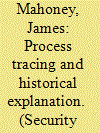

|
|
|
|
|
| Summary/Abstract |
This article offers a state of the art of methodological writings on process tracing. Its goal is to encourage the more self-conscious and transparent use of this method in security studies. The article considers process tracing for both theory testing and theory development. First, with theory testing, the article discusses the logic of historical explanation and the use of sequential analysis. It then focuses attention on two kinds of process-tracing tests: hoop tests and smoking gun tests. The article explores the mechanics through which these tests allow investigators to pass judgment on hypotheses. Second, with theory development, the article examines the use of counterfactual analysis and inductive discovery in the process of novel hypothesis formulation. The article shows how process-tracing researchers use event analysis to formulate original explanations of specific outcomes in particular cases.
|
|
|
|
|
|
|
|
|
|
|
|
|
|
|
|
| 2 |
ID:
140399
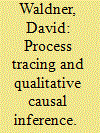

|
|
|
|
|
| Summary/Abstract |
This essay critically reviews this symposium's essays on process tracing and security studies by James Mahoney, Andrew Bennett, and Nina Tannenwald. It covers three major issues that have not been adequately addressed by previous writings on process tracing: the relationship of single case studies to more general causal claims, the conceptualization of causation, and the criteria of valid causal inference. It introduces the “completeness standard,” which combines causal graphs, event history maps, and invariant causal mechanisms. The completeness standard, it argues, bridges unit-level causal inferences and average treatment effects, invokes an epistemologically warranted conceptualization of causation, and better satisfies existing standards of causal inference by making unit homogeneity assumptions more credible.
|
|
|
|
|
|
|
|
|
|
|
|
|
|
|
|
| 3 |
ID:
140400
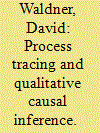

|
|
|
|
|
| Summary/Abstract |
This essay critically reviews this symposium's essays on process tracing and security studies by James Mahoney, Andrew Bennett, and Nina Tannenwald. It covers three major issues that have not been adequately addressed by previous writings on process tracing: the relationship of single case studies to more general causal claims, the conceptualization of causation, and the criteria of valid causal inference. It introduces the “completeness standard,” which combines causal graphs, event history maps, and invariant causal mechanisms. The completeness standard, it argues, bridges unit-level causal inferences and average treatment effects, invokes an epistemologically warranted conceptualization of causation, and better satisfies existing standards of causal inference by making unit homogeneity assumptions more credible.
|
|
|
|
|
|
|
|
|
|
|
|
|
|
|
|
| 4 |
ID:
140397
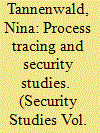

|
|
|
|
|
| Summary/Abstract |
Process tracing is used widely in security studies to advance all kinds of arguments. When, if ever, is it capable of “resolving” anything? Does the outcome of debates hinge on “good” or “bad” process tracing? In short, does process tracing lead to superior scholarly work? How would we know? This essay considers how we can judge whether some process tracing claims are more convincing than others, drawing on the competing process tracing-based claims of alternative explanations for the end of the Cold War. It argues that for process tracing to contribute to the resolution of debates, scholars will need to agree on what constitutes a key test of their explanations.
|
|
|
|
|
|
|
|
|
|
|
|
|
|
|
|
| 5 |
ID:
140401
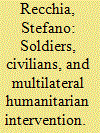

|
|
|
|
|
| Summary/Abstract |
Approval from the United Nations or NATO appears to have become a necessary condition for US humanitarian military intervention. Conventional explanations emphasizing the pull of legitimacy cannot fully account for this given that US policymakers vary considerably in their attachment to multilateralism. This article argues that America's military leaders, who are consistently skeptical about humanitarian intervention and tend to emphasize its costs, play a central role in making multilateral approval necessary. As long as top-ranking generals express strong reservations about intervention and no clear threat to US national security exists, they can veto the use of force. In such circumstances, even heavyweight “humanitarian hawks” among the civilian leadership, who initially may have wanted to bypass multilateral bodies to maximize US freedom of action, can be expected to recognize the need for UN or NATO approval—if only as a means of mollifying the generals by reassuring them about the prospect of sustained multilateral burden sharing. Two case studies drawing on interviews with senior civilian and military officials illustrate and probe the plausibility of the argument.
|
|
|
|
|
|
|
|
|
|
|
|
|
|
|
|
| 6 |
ID:
140402


|
|
|
|
|
| Summary/Abstract |
This article proposes a new theory of false optimism as a cause of war. Named for its similarity to the winner's curse in auctions, this theory explains how and why established sources of misperception (cognitive, psychological, bureaucratic, and organizational) interact with the selection of one military strategy from a set of alternatives to produce a surprising amount of additional false optimism. Even if a state's general perceptions of how well it will fare in a potential war are not biased toward optimism, this theory explains why its perceptions of the particular strategy on which it will base its plans for fighting that war will be systematically biased toward optimism. Simulations and formal modeling confirm the logic of the theory and suggest that the strategist's curse can sharply increase the probability of war due to false optimism.
|
|
|
|
|
|
|
|
|
|
|
|
|
|
|
|
| 7 |
ID:
140404
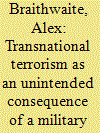

|
|
|
|
|
| Summary/Abstract |
Terrorist groups commonly cite the local presence of foreign troops as a motivation for their violence. This article examines the validity and robustness of the proposition that the deployment of military capabilities overseas provokes terrorist violence against the deploying state's global interests. A cross-national dataset, combining data on foreign troop deployments and transnational terrorist violence directed against states' global interests, is used to create a series of empirical models at the directed-dyad-year level of analysis. Descriptive statistics and multivariate analyses provide corroborative evidence of territorial terrorism. These findings are robust to a wide variety of alternative specifications and to the use of instrumental variables regression to model the potential endogeneity of terrorism to troop deployment decisions.
|
|
|
|
|
|
|
|
|
|
|
|
|
|
|
|
| 8 |
ID:
140398
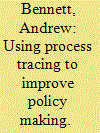

|
|
|
|
|
| Summary/Abstract |
This article argues that applying the Bayesian logic of process tracing can improve intelligence estimates, appraisals of alternative policy options, and reassessments of whether policies are working as planned. It illustrates these points by demonstrating how more systematic use of this logic could have improved each of these three elements of policymaking regarding the 2003 US military intervention in Iraq.
|
|
|
|
|
|
|
|
|
|
|
|
|
|
|
|
| 9 |
ID:
140403


|
|
|
|
|
| Summary/Abstract |
It is widely believed that cyberspace is offense dominant because of technical characteristics that undermine deterrence and defense. This argument mistakes the ease of deception on the Internet for a categorical ease of attack. As intelligence agencies have long known, deception is a double-edged sword. Covert attackers must exercise restraint against complex targets in order to avoid compromises resulting in mission failure or retaliation. More importantly, defenders can also employ deceptive concealment and ruses to confuse or ensnare aggressors. Indeed, deception can reinvigorate traditional strategies of deterrence and defense against cyber threats, as computer security practitioners have already discovered. The strategy of deception has other important implications: as deterrence became foundational in the nuclear era, deception should rise in prominence in a world that increasingly depends on technology to mediate interaction.
|
|
|
|
|
|
|
|
|
|
|
|
|
|
|
|
|
|
|
|
|